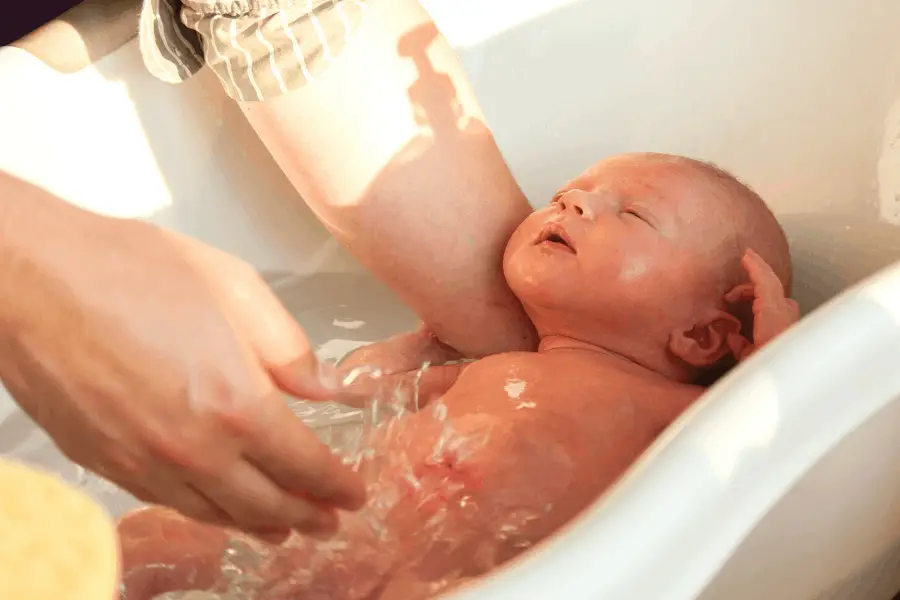
Helpful tips for new moms for the first few weeks
After about 40 weeks of waiting, the day will finally come, and you will bring your newborn baby home. How exciting! Yet, in addition to all the joy of family happiness, you also might be a little worried or have a question or two for those first few weeks. I know it can be intimidating or a bit overwhelming. After all, as a new mom, you are now suddenly entirely responsible for this tiny human being.
Here are some great tips on how to survive the newborn stage. And fully enjoy those precious first weeks at home with your baby. You will see how fast that time will pass and be very glad to look back on an amazing start as a new family in your home.
How to survive the newborn stage?
1. Take a deep breath and accept help
To manage the first few weeks with your newborn well, my first and most important advice I want to give you is fairly simple, although it might be the biggest challenge at times.
Accept any available help, be it support from your partner, your extended family, your neighbor, or obviously from your midwife. Get help with the household, let somebody bring a meal, and make sure you are mainly spending your time cuddling and enjoying your little newborn baby now at home.
If this is your second baby, check out these helpful tips for adjusting well as a family.
You also have to consider your own healing from having given birth. Check out more information on postpartum bleeding here.

2. Prevent the flow of visitors
During the first few days at home, your small family will need one thing above all: lots of rest. Even if many visitors want to come over now to see the baby, it is entirely up to you who you want to see.
Explain to your friends that you need some time for yourselves. Limit visitors to the closest relatives and friends who come by for a maximum of an hour or two. Make sure those are people who will brighten your day and make your life easier and not busier. For example, you can ask them to bring a meal, help you with some dishes while there or take the garbage out.
Too many visitors cause stress and hustle for parents, which will catch on to the baby. Also, remember that your newborn needs time to adjust to this crazy outside world and is not used to the smell and feeling of being held by other people. So give your little one time to get to know others slowly. One at a time is much better than a crowd passing the baby around.
3. Learn to find out why your baby is crying

Some newborn babies seem to sleep all day long once they are brought home. Others cry a lot. Sometimes so much that parents worry that something is generally wrong. How much a baby cries can be very individual. Even though obviously your little one is trying to communicate with you, at first, it might be hard to find out exactly what the problem is.
The main reasons for a crying newborn baby could be:
- hunger
- tiredness
- boredom or overstimulation
- annoyance or discomfort
- pain
- colic
- fear of being left alone
Checking through those reasons and trying out different ways to meet those needs often lets you find an answer to why your newborn was crying. Be prepared that you won’t always find out, though. Sometimes you will literally have tried everything, and your baby might still be crying.
A screaming newborn can be pretty exhausting for the parents. Still, make sure you hold the child in your arms. Ignoring is not an option, especially in the early days. Crying is the only means of communication that newborns have. Remember, babies always have a reason when they cry. If not meeting the specific need, holding the baby gives the newborn at least a feeling of security and being cared for. If you absolutely can’t figure out why your baby is crying, sometimes a walk in the fresh air and scenery change can help calm the child (and yourself 😊).
Find more specific tips on how to calm a crying baby when you can’t find a reason in this blog post.
4. Focus on breastfeeding your newborn baby

Many mommies find it a bit difficult to breastfeed for the first few days or weeks. It is definitely a learning process for both you and the baby. Don’t lose your patience and take your time. You will get to the point where it will become an everyday thing, and you will enjoy those intimate moments with your little one more and more.
During the first few weeks, newborns usually don’t have a regular drinking rhythm. Feeding on demand is best. On average, your baby will drink eight to twelve times within 24 hours. During the first days, the amounts will be pretty small according to your newborn’s tummy size. Don’t worry that your child doesn’t get enough. It is perfectly normal for the baby to lose some weight at first. If you keep feeding on demand, your milk supply will adapt to your baby’s need, and your little one should be back to birth weight after about two weeks.
For a good start of your own breastfeeding journey, find a detailed post with lots of helpful tips and information here.
Enjoy those precious, intimate moments with your newborn baby at home!
And please don’t worry about any weight gain from the pregnancy and loosing it right away. Your body will need time to heal first and “working on that weight” is for later.
5. Change diapers regularly

You will have to change your baby regularly, unless, you decide to go diaper free with your little one.
Unfortunately, many babies do not necessarily enjoy diaper changing. Yet, about every three to four hours, roughly six to eight times within 24 hours, it would be good for your baby to get a clean diaper. That way, you avoid that the bottom gets sore, and your newborn feels comfortable.
Also always keep an eye on the umbilical cord stump area and keep it clean and dry.
The ideal time to change diapers is mostly after feeding when the baby is relaxed, full, and calm. But be careful: babies generally like the feeling of being without a diaper. So, always be prepared to avoid minor “accidents.” You might find it easiest to leave the old diaper under the baby’s bottom until you can push the new one in at lightning speed.
Specific tips on how to handle a baby diaper blowout (or even how to prevent it) you can find here.
6. Find the best solution for your newborn baby’s sleeping place

Baby cot, extra bed, or family bed? Here you as parents must decide and find out for yourselves what you prefer. Some like to take their newborn to their own bed. Many babies actually sleep the best there. At what stage and age the child gets used to the own bed is also entirely up to the parents. In my opinion, it is simply important to find a solution where the whole family can feel comfortable. It is key that everyone gets enough rest.
A thick, soft blanket or a thin blanket on a carpet on the floor is sufficient in the living room. That can serve well as a place for a short baby nap.
You can also carry your newborn on you during the day and let your baby nap in a baby carrier. Your little one will enjoy being close to your heart, just like when you were still pregnant.
7. Keep your newborn baby warm but not too hot

Generally said, newborns like it warm. Your baby has just spent a whole 9 months in your womb and is used to a warm, cozy environment. Newborns must still learn to regulate their body temperature, so it is crucial to make sure your baby is wearing enough clothes. Especially the head needs to be protected. Due to its big size in relation to the baby’s tiny body, a lot of the warmth can escape via the head. A cute little hat can help out.
On the flip side, you must be careful not to overdress your baby. It can become dangerous when your newborn overheats. I know it is difficult to determine whether your baby is too hot or too cold. The main clue is the little one’s neck. Check regularly with your fingers how it feels there. It should be warm, but not hot or sweaty.
Inside, the ideal room temperature during the day should be between 18 and 21 degrees. A winter outfit could be a sweater, a body with long arms, and a romper and socks.
In this post you find a detailed guide on how to dress your baby for sleep in winter.
On hot days in summer, only the diaper and a light body may be sufficient. Keep checking your baby and simply adapt with more or fewer layers of clothes. You will figure it out fast; you will see.
For more ways of how to keep your baby cool read this post.
8. Bath your baby for the first time

Unlike back in the days, most likely, your newborn won’t be bathed immediately after birth anymore. Most doctors and midwives recommend waiting until the umbilical cord residue falls off and the navel has healed well. Until then, it is better to clean your baby once a day with a wet rag.
Following that guideline, at the latest 14 days after the birth, it will be time for you to bathe your newborn baby for the first time at home. Be aware, though, that it makes sense to bathe your baby only once or twice a week initially. Otherwise, the fresh baby skin will dry out too fast.
If you want to use anything else than just water for your baby’s first bath, make sure you have a mild Baby soap without added perfumes ready.
For the bath itself, the water temperature should be around 37°C which is your baby’s body temperature. Hold the little one with one arm, the head resting on your wrist while your hand holds the upper arm of your baby. That way, you make sure your newborn’s head doesn’t dip in the water. And you have your other hand free to bathe your baby gently.
Make sure that everything is made ready beforehand for when you take your little one out again. Since babies cool out very fast, you want to dry your newborn immediately after taking him out of the water and put him back on a diaper and cozy clothes.
And don’t forget: if Daddy is up for it, make sure you do it together and take some cute pictures. You surely won’t regret having a sweet memory of that first baby bath! 😊
For more helpful information check out this full step-by-step guide about bathing your newborn.
Surviving the newborn stage can be challenging at first.
But trust me, you will soon find out how rewarding it is and enjoy getting to know your baby more and more each day.

I hope you can picture the “surviving the newborn stage” a little less stressful now and apply some of my tips.
I am sure that it won’t be perfect for you too, but it will be a fantastic first few weeks with your baby, and you will treasure that time forever. Try to soak in every moment, and don’t let unnecessary stress burst your “baby bubble.”
Also, don’t forget to take some time to yourself, momma! If you enjoy reading check out these mom-hacks on how to find time to read when having a newborn.
Find more helpful information and tips for life with a baby here.


These are wonderful tips for new moms. I wish I had read up about what to expect ❤️